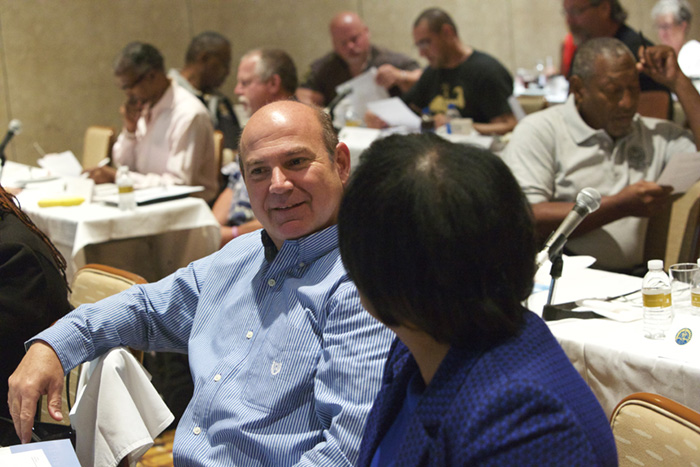Published 17 Jun, 2016
In keeping with TWU International’s pledge to offer more education and resources for locals, the Transit, Universities, Utilities and Services Division held a two-day training conference last week for nearly 75 of its local presidents and officers, who were joined by colleagues from the air and railroad divisions. The meeting was called to order and chaired by International Vice President, Administrative Assistant to the International President and Division Director Jerome Lafragola, who sees the yearly conference as a way “to continue to build strength and unity within the Transit Division. It is helpful to bring the leaders together in person to share ideas and exchange tips and strategies to maintain a united workplace.”

At the start of the conference, participants received a legislative update from Government Affairs Director Brendan Danaher on: the status of the FAA bill, what the continuing vacancy on the Supreme Court means for unions, and why a coalition of aviation unions are opposed to the Department of Transportation’s approval of Norwegian Air International’s (NAI) application to start service to the U.S.
In discussing the FAA reauthorization and the NAI, Danaher pointed out that the most successful legislative pushes, such as that with the FAST Act last year, are union-wide efforts. Without the assistance of TWU International and members across the union’s other divisions, the transit legislation never would have passed.
Lafragola and Danaher also reviewed TWU’s efforts to increase voter registration ahead of November’s general election. Lafragola described how TWU’s International Campaign Unit is working with locals and State Conferences to register members to vote, and described the other critical campaigns the ICU has mounted, including the American Airlines “Today We Unite” campaign, the Southwest Airlines contract campaign, and the larger Election 2016 campaign. He indicated that with TWU’s endorsement of Hillary Clinton for President, the union will continue to provide materials for locals to educate their members and to ensure that voter turnout is increased for this crucial election.
The afternoon was dedicated to presentations and discussion on the dangers our transit members face every day from diesel exhaust fumes.
The first panel, “Battling Demon Diesel,” was headed by Local 100 Secretary-Treasurer Earl Phillips. The attendees heard from attorney Robert Grey, who successfully argued before the Workers Compensation Board that a Local 100 member’s death from lung cancer was due to exposure to diesel fumes and from Dr. Lewis Pepper, an occupational health specialist.
The second panel brought together officers from four locals to continue the discussion. Local 1400 Vice President Pat Reynolds, Local 252 President Deborah Hagan, Local 171 Executive Board Member Francis Borzo, Local 208 President Andrew Jordan, and Local 234 President Willie Brown discussed the issues faced on the job and opened up the floor for other locals to share their stories of concern and even success in mitigating the danger. Pressuring agencies to deploy more hybrid and electric buses, replacing diesel power equipment, and providing adequate ventilation and safety equipment are all key strategies to keep our members healthy.
Several local officers shared that they have joined with natural allies in this fight—residents who live near transit facilities and local environmental groups—to put pressure on transit companies and local governments to address the issue.
A lively presentation came on day two with a panel from the Federal Mediation and Conciliation Service (FMCS), the agency that among other things, promotes the development of sound and stable labor management relationships. In response to locals seeking a more cost effective and efficient way to resolve grievances, the division invited the FMCS to provide training on grievance mediation, which has been a free service provided by the government entity since 1947. The panelists queried the group on which locals have employed their services or that of an outside mediator. They then broke the attendees into smaller groups for a role-playing exercise on mediating a dispute, and had the groups present their findings. Several attendees remarked that they were thrilled to learn about FMCS’ free services, which would save their local money.
That was followed by a presentation by Larry Willis, Secretary-Treasurer of the AFL-CIO Transportation Trades Department who led a conversation about new and proposed regulations facing bus and transit operators, especially new federal sleep apnea rules and hair testing for drug use. The latter, Willis pointed out, is based on bad science and racial bias, and the TTD is working to modify the legislation and has successfully ensured that the final bill restores the role of scientific experts.
Willis and the local officers also discussed “the Uberization of Transit” and the effect ride sharing companies are having on public transportation, particularly para-transit.
Finally, training on how to effectively use social media to promote the work of the locals, the International and its priority issues was conducted by Emma Chadband of TWU’s Communications Department. For some attendees it was a refresher course and for others an opportunity to sign up for Facebook and Twitter accounts on the spot and even tweet about the social media session! As Local 252 President Debra Hagan remarked, “I just needed someone to get me started. Now I’m off to the races!”
The meeting concluded with the traditional presidents’ roundtable discussion, where locals were able to share conference feedback and pressing issues on their shop floor.
Director Lafragola urged everyone to turn their meeting conversations into action, and to use the conference not only as an opportunity to learn, but a way to empower and inspire members with the strategies discussed.
By holding conferences such as these, TWU continues to build on the resolutions passed at the 2013 convention: empowering locals, unifying TWU, and providing a safe workplace for members. Participants left the meeting eager to return home to put their training in action by engaging with members and fighting for TWU’s priorities.
